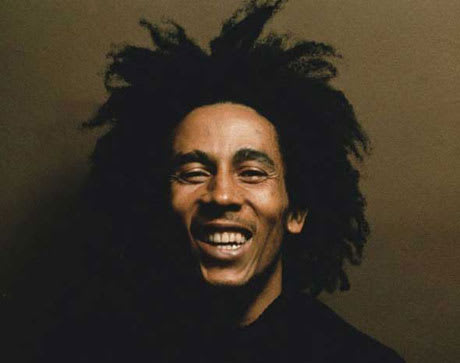It's been over three decades since Bob Marley passed away from cancer on May 11, 1981, yet his music continues to dominate the reggae world and posters of his iconic face are still emblazoned on dorm-room walls and the T-shirts of marijuana enthusiasts. And considering this cultural ubiquity, it's incredible that a major documentary on the life of the musician has never been made.
The reason is that Marley's family has maintained strict control over access to his music and archives since his death, making such a film nearly impossible to create. Thankfully for fans, this changed with Kevin Macdonald's Marley, a film for which the Marley clan provided their full support (Ziggy Marley is an executive producer), making it likely that it'll become the singular and definitive document of Bob Marley's life.
Macdonald takes a scrupulously straightforward and traditional approach to documenting the musician's life. A mainly chronological birth-to-death narrative, he fluffs out the film to a whopping 144-minute run-time with the requisite interviews with friends and family, archival performance footage, private photograph and, of course, the music of Bob Marley. Surprisingly, the music isn't the main focus, taking a backseat here thematically. Instead, Macdonald digs deep into the close relationships and anecdotal stories previously not known by fans.
Amidst the many touching tales, the one that stands out is told by Marley's half-cousins, which details how his father's family rejected him, leading to one of his most powerful songs, the farsighted "Cornerstone." Two family members from his father's side are given a set of headphones and asked to listen to the lyrics, providing the camera with a real-time reaction, shedding some insight on the icon and how those around him perceived him.
Unfortunately, despite the plethora of interviews and stories such as this, which attempt to paint a picture of Marley, we never truly get a sense of his personality or identity. Some memories and reflections contradict each other, focusing incessantly on his Rastafarian religion and status as a holy man, glossing over his scoundrel tendencies, such as having 11 children with seven different women.
By the end, there are too many conflicting points and an overall sanitized sensibility that leaves the Jamaican musician as much of an enigma ever. Fans will undoubtedly enjoy the material, getting their hands on some information and footage previously unavailable, but one has to wonder whether or not the family's involvement in this film has cast a shade of bias on who Bob Marley truly was.
(eOne)The reason is that Marley's family has maintained strict control over access to his music and archives since his death, making such a film nearly impossible to create. Thankfully for fans, this changed with Kevin Macdonald's Marley, a film for which the Marley clan provided their full support (Ziggy Marley is an executive producer), making it likely that it'll become the singular and definitive document of Bob Marley's life.
Macdonald takes a scrupulously straightforward and traditional approach to documenting the musician's life. A mainly chronological birth-to-death narrative, he fluffs out the film to a whopping 144-minute run-time with the requisite interviews with friends and family, archival performance footage, private photograph and, of course, the music of Bob Marley. Surprisingly, the music isn't the main focus, taking a backseat here thematically. Instead, Macdonald digs deep into the close relationships and anecdotal stories previously not known by fans.
Amidst the many touching tales, the one that stands out is told by Marley's half-cousins, which details how his father's family rejected him, leading to one of his most powerful songs, the farsighted "Cornerstone." Two family members from his father's side are given a set of headphones and asked to listen to the lyrics, providing the camera with a real-time reaction, shedding some insight on the icon and how those around him perceived him.
Unfortunately, despite the plethora of interviews and stories such as this, which attempt to paint a picture of Marley, we never truly get a sense of his personality or identity. Some memories and reflections contradict each other, focusing incessantly on his Rastafarian religion and status as a holy man, glossing over his scoundrel tendencies, such as having 11 children with seven different women.
By the end, there are too many conflicting points and an overall sanitized sensibility that leaves the Jamaican musician as much of an enigma ever. Fans will undoubtedly enjoy the material, getting their hands on some information and footage previously unavailable, but one has to wonder whether or not the family's involvement in this film has cast a shade of bias on who Bob Marley truly was.
